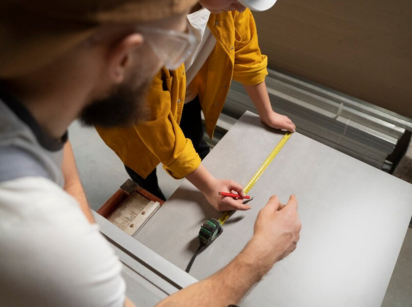Become a Professional Wall and Floor Tiler in Australia
Wall and floor tiling is a craft that combines precision, artistry, and technical skill to create stunning surfaces in homes and commercial spaces. Whether you're installing tiles in kitchens, bathrooms, or large public areas, becoming a professional wall and floor tiler can open doors to a rewarding and lucrative career. With a growing demand for skilled tradespeople across Australia, this profession offers job stability, competitive salaries, and opportunities for self-employment. From new residential projects to large-scale commercial developments, wall and floor tilers play a crucial role in enhancing the functionality and aesthetics of spaces.
So let us explore the steps to starting your journey, the responsibilities of the role, and how to find quality training to become a qualified wall and floor tiler and build a successful career.
How to Begin a Career in Wall and Floor Tiling
If you’re intrigued by the prospect of a hands-on career where every day brings a new challenge, wall and floor tiling might be the perfect fit. Here’s how you can start your journey:
1. Understand the Role:
A wall and floor tiler works on various surfaces to apply tiles in patterns and layouts that suit the design specifications. The work is both technical and creative, making it ideal for individuals who enjoy problem-solving and aesthetic design.
2. Gain Initial Experience:
Before committing, explore the field by working with a professional floor wall tiler. Shadowing a tiler can provide insight into the job's daily tasks, tools, and challenges.
3. Complete Relevant Education:
Enrolling in a structured training program, such as Certificate III in Wall and Floor Tiling, is essential. This nationally recognized qualification equips you with the technical skills and industry knowledge to excel in the trade.
4. Apprenticeship:
Hands-on experience is vital in this profession. Many aspiring tilers begin as apprentices under experienced tradespeople. This allows you to hone your skills while earning a wage.
5. Licensing and Registration:
In Australia, licensing requirements for wall and floor tilers vary by state. Research local regulations to ensure you meet the criteria to work legally.
Tasks and Duties of a Wall and Floor Tiler
Wall and floor tilers have a wide range of responsibilities requiring precision and adaptability. Here are some of the key tasks:
1. Surface Preparation:
A floor wall tiler ensures that surfaces are clean, smooth, and ready for tiling. This often involves removing old tiles, leveling uneven areas, and applying waterproofing materials.
2. Tile Cutting and Layout:
Measuring and cutting tiles accurately is a core skill. Wall and floor tilers must plan layouts meticulously to ensure symmetry and alignment with design specifications.
3. Tile Installation:
Using adhesives, spacers, and specialized tools, tilers place tiles on walls and floors, ensuring they adhere securely.
4. Grouting and Finishing
Once tiles are set, grouting fills the gaps between them for a polished, seamless appearance. Wall and floor tilers also clean and seal surfaces to enhance durability.
5. Problem-Solving
Every project presents unique challenges requiring creative solutions, from dealing with irregular surfaces to customizing patterns.
6. Safety Compliance
Adhering to safety standards is crucial. Wall and floor tilers must use personal protective equipment (PPE) and ensure job sites are hazard-free.
Finding a Master Wall and Floor Tiler in Australia
Apprenticeships and mentorship are critical for developing expertise as a wall and floor tiler. Finding an experienced master tiler to guide you can significantly accelerate your learning curve. Here are some tips:
- Research Local Professionals
Use directories and online platforms to identify skilled floor wall tilers in your area. Look for individuals with excellent reviews and a solid reputation.
- Network Within the Industry
Attend trade shows, join tiling associations, and participate in workshops to connect with established professionals.
- Ask for Referrals
If you’re enrolled in a Certificate III in Wall and Floor Tiling
program in Australia, your instructors or peers might know reputable tilers looking for apprentices.
- Look for Apprenticeship Opportunities
Many master tilers are open to taking on apprentices, especially those with foundational knowledge gained from formal training.
Why APSLEY is the Ideal Starting Point
If you’re serious about becoming a professional wall and floor tiler, choosing the right training institution is critical. APSLEY stands out as a premier choice for aspiring tilers in Australia. Here’s why:
a. Comprehensive Training Programs
APSLEY offers Certificate III in Wall and Floor Tiling, a course designed to provide both theoretical knowledge and practical experience. Students learn everything from tile selection and installation to advanced techniques like mosaic tiling.
b. Experienced Instructors
The faculty at APSLEY includes seasoned professionals who share real-world insights and hands-on guidance.
c. State-of-the-Art Facilities
APSLEY provides access to cutting-edge tools and materials, ensuring students are well-prepared for industry demands.
d. Job Placement Support
APSLEY has strong ties with local businesses and industry leaders, helping graduates secure apprenticeships and employment opportunities.
e. Flexible Learning Options
With a mix of on-campus and online learning, APSLEY caters to students with diverse needs and schedules.
Conclusion
Becoming a professional wall and floor tiler in Australia is an exciting journey that combines creativity, technical skill, and career growth. By starting with a solid foundation through a Certificate III in Wall and Floor Tiling
, gaining hands-on experience, and learning from industry experts, you can build a successful career in this dynamic field. APSLEY College is here to support you every step of the way, offering top-tier training and resources to help you excel.
Embark on your tiling journey today and transform your passion for design and construction into a thriving profession.

